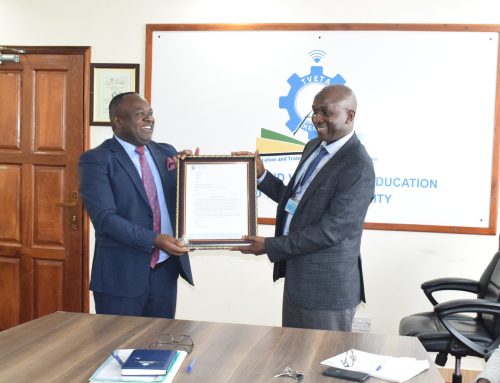Technical and Vocational Education and Training Authority (TVETA) has developed Prior Learning Assessment and Recognition (PLAR) standards and guidelines that will now allow individuals, especially the uncertified artisans in the Jua Kali sector to gain recognition of their prior learning skills and experience.
Most of the artisans in the informal sector have acquired and perfected various skills through apprenticeship and ‘learning on the job’ without pursuing any formal training in a learning institution. This means that they do not have certificates that can enable them to seek employment in the formal sector or even register companies.
However, now with the development of PLAR standards and guidelines, the skilled labour in the informal sector will be brought into the mainstream labour market.
According to the TVET Authority Director-General Dr Kipkirui Langat, the guidelines have been developed to guide TVET providers on how to prepare, plan and implement PLAR within the TVET sector. The guidelines will also inform prospective candidates on what they can expect from PLAR and how they can actively participate in the assessment process.
“We have developed these standards and guidelines after wide consultations with the stakeholders and were guided by the existing legal framework. The guidelines are applicable to all PLAR providers in the TVET sector who offer national qualifications.”
“We have also recognized the mandate of various players in the sector. For instance, guidelines for credit transfer arrangements will be provided by the Kenya National Qualification Authority (KNQA), while certifications will be offered by qualifications awarding institutions like CDACC among others” Dr. Kipkirui said.
The guidelines cover five aspects of PLAR implementation. These include institutional readiness for providing PLAR within the TVET sector, the steps involved in the assessment process, the roles and responsibilities of all stakeholders involved, monitoring and quality assurance required and the review of PLAR Process.
According to the guidelines, all PLAR providers must use assessors and verifiers who are approved by recognized by TVETA and certification agencies.
TVETA accredits trainers, assessors, and verifiers. The names of those accredited are posted in the TVETA website. However, these accredited assessors and verifiers shall be approved by assessment bodies after they are accredited and shall renew their accreditation after every 3 years with TVETA having fulfilled Continuous Professional Development (CPD) requirements as trainers. Additionally, the assessors shall have at least one level higher than candidates to be assessed.
The TVETA Director-General explains that the PLAR candidates shall be assessed against unit standards and qualifications registered on the Kenya National Qualification Framework (KNQF).
“The PLAR providers shall identify unit standards and / or qualifications registered on the KNQF and offered at their respective institutions for PLAR. The procedures and criteria for the assessment of qualifications shall be transparent, coherent and reliable and basically meet the normal assessment standards,” Dr Kipkirui explains.
Once the arrangements for PLAR are ready, TVETA shall announce through a gazette notice and provide application forms and procedures. The Authority shall then do the initial assessment to ensure that there are relevant systems in place to conduct the assessment, that is, there are relevant accredited units of competency, accredited assessors/verifiers and approved assessment centres with the capacity to conduct the assessment.
The assessment/ certification centres shall then invite applications from the general public to have their prior learning assessed. Individuals/employers/groups of individuals shall make a request to the Assessment/ Certification agency for the assessment of competence in a specified occupational area and undertake certification.
Different key players have been mandated to perform specified responsibilities. For instance, the TVET Authority, will accredit, license and register PLAR TVET providers, assessors and moderators, verifiers and assessment centres as prescribed in Section 17 (1) of the TVET Act, 2013. The Authority will also provide support and guidance to PLAR providers on PLAR implementation, monitor and audit PLAR providers, and develop standards and guidelines for implementing PLAR within the TVET sector.
Further, the Authority will undertake research on PLAR implementation strategies and modes of delivery and share findings and recommendations with PLAR TVET providers and also maintain a central database of PLAR providers, assessors, and verifiers.
The registered and/or registered PlAR TVET providers are expected to comply with all the statutory requirements. These include applying for an expansion of scope to offer PLAR training and assessment and also implement PLAR policies, processes and procedures.
The providers should also ensure that sufficient resources are available for PLAR implementation and have complied with quality audits undertaken by accreditation bodies.
The PLAR certification/assessment agencies should be ready to provide the capacity to assessors and verifiers and direct them to be accredited by TVETA. They should also inform applicants about the assessment arrangements and implement fit-for-purpose assessment methods, approved by the TVETA, including integrated assessment tasks covering more than one-unit standard.
It is also the responsibility of the certification agencies to convene PLAR assessment panels to coordinate and conduct PLAR assessments according to relevant policies and principles by assessing applicants’ collections of evidence against required standards and criteria.
Their wide mandate also includes communicating the results to applicants, by informing applicants that recommendations have been made to TVETA/awarding body; give feedback and guidance on how to address areas for development. The agencies will also be expected to comply with all moderation and quality assurance requirements of the Authority and provide records of assessment to the assessment centre for safekeeping. Additionally, they will ensure that all original documents or materials are kept and remain property of the Assessment/ Certification Agency.
The TVETA Director-General observes that to ensure that PLAR is widely accessible, fees for the delivery and administration of PLAR services should be affordable so that cost does not become a barrier to prospective candidates.
“The PLAR services provider shall ensure an optimum number of candidates register to allow sharing of the cost of assessment and gap (top-up) training,” Dr Kipkirui concludes.


